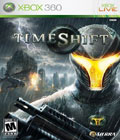Genre: FPS
Publisher: Sierra/Vivendi
Developer: Saber Interactive
Release Date: Fall 2007
There’s a long article waiting to be written about the troubled development history of Timeshift. It began its existence as an Atari product in 2005, when it was being shown off at the pre-E3 conferences by a surprisingly confrontational member of the development team, and was eventually sold to Vivendi, which is now Sierra.
At last year’s Sierra Gamer’s Week in Palm Springs, Timeshift was shown off again for the first time in a while. The multiplayer had been worked out, but the singleplayer… well, the phrase “train wreck” comes to mind.
Timeshift’s big gimmick was and is the ability to rewind, stop, or accelerate the player through time, enabling anything other than the player’s own momentum or status to be unchanged; you could rewind time to stop someone else from falling or dying, but not yourself.
In theory, this allowed all sorts of bizarre and awesome strategies and combat sequences. You could steal weapons from enemies’ hands, dodge their projectile as they hung motionless in the air, rewind their bullets back into the gun, or play the game as a weird sort of retroactive pacifist; kill a few guys, get past them, and rewind time so they’re now alive but have no idea where you are and are no longer in your way.
In practice, shifting time was a nifty way to get yourself killed unless you were specifically using it to ruin some random mook’s entire life. The timeshifting gimmick was hastily stitched onto a fairly typical urban-warfare shooter, which meant randomly shifting time outside of a fight or when you were “supposed” to do it could have deeply negative consequences, such as now being underneath a giant explosion that would’ve been stage dressing if you’d been playing “normally.”
The multiplayer, on the other hand, was and is fairly tight. The timeshifting from the main game now takes the form of specialized grenades, which project fields of slow time from their point of detonation. Anything that enters the fields, from gunfire to players, is slowed to the point of near-immobility, making the grenades easy ways to create either portable cover or sitting ducks.
Now it’s a year later, and many things have changed. Timeshift’s singleplayer game has been altered almost to the point of unrecognizability; the plot has changed, and while many elements of the previous game persist, the overall effect is much different. The extra horsepower of the next-gen systems Timeshift is being released on has been used to great effect (when you stop time in the first level during a rainstorm, you can see each individual drop of water hanging motionless in the air; it’s like moving through a high-quality photograph), and the general level design has been dramatically improved.
The general thrust of the plot is the same as it was before. A suit has been invented that allows the wearer and only the wearer to travel through time. Two suits are created, one of which is promptly stolen. The thief plants charges to destroy the facility, and you use the second suit to escape the destruction.
When you rematerialize, you’re in the early twentieth century, which has turned into an Orwellian nightmare. Resistance fighters using modern assault rifles fight a losing battle against the soldiers and war machines of some dystopian world order, and you’re right in the middle of the battle. The suit malfunctions upon arrival in this new timeline, allowing you to distort local time but not to make broad jumps through the timestream.
Long story short: you gotta go shoot these guys. Timeshift is an FPS powered by Havok and uses Saber's own in-house Saber3D multiplatform (PC, Xbox 360 and Playstation3) engine, with all that implies; the physics are realistic, the environments are very darkish but nonetheless highly detailed, and the enemies all do that annoying thing shooters do where you have to double-tap them to make absolutely sure they’re dead. (I always wind up vaporizing bastards in these games, because it’s easier than constantly mistaking their injury animation for a death slump.)
The time shifting powers inherent in your suit come into play both practically, as it allows you to circumvent various obstacles, and tactically. If you’re facing an enemy fortification that you can’t take over through main force, stop or slow time and run around it so you have a better angle. As in the earlier versions of the game, your timeshifting doesn’t affect anything other than you and what you’re holding, so you can stop time and run across water or yank weaponry out of enemies’ hands.
There’s also a crossbow that fires bolts that explode after a few seconds, so I’d probably recommend the game just based off of that. I like being able to tag a guy, then duck behind cover as he explodes into sixty pounds of jambalaya. That’s how I get down.
The multiplayer mode of Timeshift isn’t dramatically different from last year’s version, although the graphics look a little better than it did. The big draw of the current version is that the game is extensively customizable; you can turn on insta-gib, turn off the weapons, change the gravity, and more.
Right now, we’re in the middle of a surfeit of FPS riches, between high-profile offerings like Halo 3 and Unreal Tournament and a bunch of decent, lower-ranked titles. Timeshift is one of the more conceptually interesting games in the latter category, and has come a long way since its frankly embarrassing early version. After five years in development hell, it’s finally coming close to release.
More articles about TimeShift











 TimeShift is an innovative FPS in which players control time to complete missions and defeat foes, TimeShift will leverage first-of-its-kind gameplay abilities and functionality, the latest graphics technology, and high production values to create a truly unique action game experience.
TimeShift is an innovative FPS in which players control time to complete missions and defeat foes, TimeShift will leverage first-of-its-kind gameplay abilities and functionality, the latest graphics technology, and high production values to create a truly unique action game experience.










































